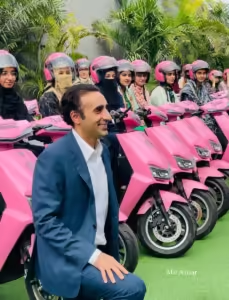A Bold Initiative for Women’s Mobility in Karachi – Bilawal Bhutto Zardari gifted 200 Pink Scooties to Karachi Women
Karachi saw a historic event when Bilawal Bhutto Zardari distributed 200 Pink Scooties to students and women, a gesture that sought to redefine the history of women’s mobility and freedom in Sindh. The event, welcomed with the fervor of people, meant not only the handing over of the vehicles but the handing over of opportunities, freedom, and self-confidence as well.
The program is in line with the bigger vision of the Sindh government to empower women and facilitate them to move forward in education, employment, and day-to-day life free from the obstacles of transport.

CM Murad Ali Shah’s Vision for Empowerment
In his address during the ceremony, Chief Minister Murad Ali Shah highlighted that the Pink Scooty Scheme was not a singular initiative but an extension of Sindh’s overall policies for women empowerment. He spoke of how mobility tends to be the missing link in the availability of opportunities for women, and the scheme directly answers that stumbling block.
He highlighted how women’s active participation in education, business, and society requires more than just policies—it demands real, tangible resources that enable them to move freely and safely. The scooties, painted in pink to symbolize strength with grace, stand as a visible emblem of that freedom.
Sharjeel Inam Memon Unveils Next Milestone: Pink Taxi Service
While the scooty rollout generated buzz, Sindh’s Transport Minister Sharjeel Inam Memon unveiled that this is not the end of the ride. He unveiled proposals for a Pink Taxi service, with women drivers and passengers. It will provide safer travel options, increase jobs, and enhance women’s autonomy over mobility further.
This two-pronged proposal—scooties today and taxis tomorrow—lays down a blue print for long-term sustainable female engagement in Sindh’s transport sector.
More Than Scooters: Altering Lives and Attitudes
For most of the 200 women who received their scooties, this was not simply a question of owning a two-wheeler; it was about regaining independence. Young female students told of how the scheme will save hours of traveling, while working women expressed their relief at finally being able to ditch untrustworthy public transport.
There is a story behind each scooty—a daughter who can now go to university without having to wait for rides, a mother who can drive herself to fetch her children from school, or an entrepreneur who can scale her business by moving unencumbered around the city. Empowerment isn’t a matter of rights being handed out, but of enabling action. Securing mobility, women are given the ability to decide their own direction.
A Social and Economic Ripple Effect
Experts believe that this scheme would have long-term social and economic effects. Greater mobility makes women more active in the workforce, makes women more likely to attend higher education institutions, and improves health care and civic space access. It also breaks cultural stereotypes in which women are restricted to small domains.
The Pink Scooty Scheme and the launch of the Pink Taxi service have the potential to cause a ripple effect—promoting more inclusive urban development and stimulating similar programs in other provinces.
Sindh Leads the Way
By doing this, Sindh stands as a leader in forward-looking policies for women in Pakistan. The transfer of 200 Pink Scooties is not merely a government undertaking; it is an emblem of faith in women’s strength and resilience.
As Karachi’s roads welcome the sight of these vibrant pink scooters, they carry more than their riders—they carry a vision of equality, empowerment, and independence. The upcoming Pink Taxi service will only strengthen this momentum, ensuring that the road to women’s empowerment in Sindh continues forward, stronger than ever.
Visit Pakistan Updates for more news and updates.




